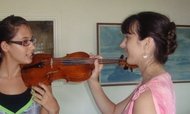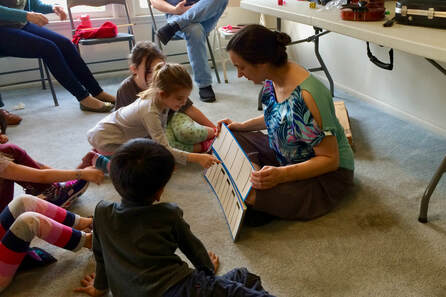Lessons
Suzuki Style - Short Term - Studio Policies & FAQs - What You Need
UPDATE 2024:
I continue to offer a combination of online and in-person lessons. In person lessons are held indoors or outdoors in Monrovia, weather permitting, with hand sanitizing, masks, and all eligible persons vaccinated before beginning in-person lessons.
I continue to offer a combination of online and in-person lessons. In person lessons are held indoors or outdoors in Monrovia, weather permitting, with hand sanitizing, masks, and all eligible persons vaccinated before beginning in-person lessons.

Teaching "Playing Position"
I teach both children and adults using Suzuki Method philosophy and repertoire, and alongside this, I use Alice Kanack's Creative Ability Development (CAD) curriculum for teaching improvisation.
For babies and toddlers (ages 0-3 years & 11 months) and their parents, I teach Suzuki Early Childhood Education (music and movement) group classes. For more info or to sign up for the baby & toddler class, please see the Pasadena Suzuki Music Program's website.
For children age 3 & up, Suzuki-style lessons include a student (the child) and a Practice Partner (usually the child's guardian) who sign up to attend together as a 2-person team. These child-adult teams attend weekly private lessons and weekly group classes (a twice-a-week commitment). (Adults seeking lessons for themselves may attend alone or with a friend or family member).
For babies and toddlers (ages 0-3 years & 11 months) and their parents, I teach Suzuki Early Childhood Education (music and movement) group classes. For more info or to sign up for the baby & toddler class, please see the Pasadena Suzuki Music Program's website.
For children age 3 & up, Suzuki-style lessons include a student (the child) and a Practice Partner (usually the child's guardian) who sign up to attend together as a 2-person team. These child-adult teams attend weekly private lessons and weekly group classes (a twice-a-week commitment). (Adults seeking lessons for themselves may attend alone or with a friend or family member).
A child's Practice Partner or "home coach" is usually a parent, but can also be a grandparent, aunt or uncle, close family friend, nanny, or an older music student hired to be a "music sitter", etc.
Practice Partners attend lessons with the child, and do not need any prior musical experience. They learn to play the instrument alongside the child at the beginner levels, and provide encouragement, logistical support, and practice reminders at the more advanced levels. The Practice Partner also takes notes, pictures, and makes brief recordings of homework assignments during each lesson. At home, the Practice Partner coaches and encourages the student using these notes, pictures and recordings as a reference, on a daily basis.
The practice partner's support gradually recedes into the background as children gain the expertise needed to practice on their own. By helping your child practice daily when they begin, you're providing a place where they can succeed AND you're modeling many excellent life skills (such as longer memory retention, ability to follow multi-step instructions, basic organizational skills, self-control, and the ability to delay gratification in order to achieve long-term goals.)
If you are unable to find a family member or friend to be a loving adult practice partner for your child, it may be possible for me to help you find an older, more advanced student who can be hired as a Practice Partner or "music sitter". Please ask about this if you are interested.
Practice Partners attend lessons with the child, and do not need any prior musical experience. They learn to play the instrument alongside the child at the beginner levels, and provide encouragement, logistical support, and practice reminders at the more advanced levels. The Practice Partner also takes notes, pictures, and makes brief recordings of homework assignments during each lesson. At home, the Practice Partner coaches and encourages the student using these notes, pictures and recordings as a reference, on a daily basis.
The practice partner's support gradually recedes into the background as children gain the expertise needed to practice on their own. By helping your child practice daily when they begin, you're providing a place where they can succeed AND you're modeling many excellent life skills (such as longer memory retention, ability to follow multi-step instructions, basic organizational skills, self-control, and the ability to delay gratification in order to achieve long-term goals.)
If you are unable to find a family member or friend to be a loving adult practice partner for your child, it may be possible for me to help you find an older, more advanced student who can be hired as a Practice Partner or "music sitter". Please ask about this if you are interested.
 Rhythms and skills for reading music in Suzuki group class
Rhythms and skills for reading music in Suzuki group class
In my studio, you have the opportunity to learn and practice:
- beautiful tone quality and excellent intonation
- balanced, healthy posture (so that you can enjoy making music for many years to come)
- ear training & musicianship skills, including playing music by ear
- creativity through musical improvisation (yes, you can improvise!)
- skills for reading and analyzing music, including the basics of music theory
- skills for playing with other musicians in both small and large ensembles
- sharing music with others through formal and casual performances
- Viola AND Violin
- Repertoire in the western classical music tradition, through the Suzuki books
- Melodies or tunes from some folk & popular music traditions, including various holiday tunes
|
Suzuki & CAD Teaching Philosophy:
In the same way that we expect every person to show a "talent" for learning and speaking their native language, we can also expect that every person has a "talent" to learn, play, & create music. The discipline and creative expression that come with learning music by great artists builds character and enriches a child's life. We - the teacher and the parents - just need to provide the kind of environment that makes music into one of a child's "native" languages! If you'd like a head start on a deeper understanding the Suzuki philosophy before your begin lessons, please read Shinichi Suzuki's book Nurtured By Love. If you'd like a head start on understanding the Creative Ability Development (CAD) philosophy which was inspired by Suzuki's ideas and which I use to guide students through improvising & creating their own musical ideas, please read the preface to any of Alice Kanack's Fun Improvisation series of books. Repertoire & Textbooks:
When taking Suzuki-style music lessons with me, you will use the core Suzuki repertoire, and some supplemental materials. I teach:
I also take requests if students want to learn to play a particular song outside the Suzuki repertoire, and occasionally my students learn holiday-inspired music depending on the season. Depending on the student's needs, I may also use other books, which frequently include:
Get Started:
Inquire about starting lessons by filling out the form at the bottom of this page. |
My Teaching Style:
I teach with patience, gentleness, and persistence. I have high musical standards, and I challenge my students to go beyond what they think they can do - but I also come alongside them with the needed support for each step. I expect students to practice daily between lessons but I also understand the occasional need to be busy with other life priorities. My goal for each of my students is that they learn: to create music that can make a more beautiful, more healthy, and more expressive place of their heart, mind & body; to share & enjoy this music not only in their home, but with friends and community; and to touch the lives of anyone who hears them play. Levels, Ages, and Instruments:
I teach all levels of viola students - absolute beginners through advancing students (Suzuki Viola volumes 1-9 and beyond). I also teach violin students up through the intermediate level (around the end of Suzuki Violin book 4). I work with all ages in violin or viola lessons, from pre-school age (about 3 or 4 years old) up through adult learners. For babies and toddlers, I recommend the Suzuki Early Childhood Education (or other Music and Movement) classes as preparation for playing an instrument later in life. The appropriate age for you or your child to begin viola or violin lessons may vary; if you are unsure whether or not your child is developmentally ready to begin formal music instruction, please contact me to set up a time to meet! When and Where:
I teach through the school year (September through May) with breaks for Thanksgiving, Christmas, the week of President's Day, and Easter. My summer availability (June through August) changes from year to year, and is usually between 4-6 weeks of available teaching time over the entire summer. I encourage students to sign up for summer music institutes or music festivals to supplement your summer lessons. Currently, I teach group classes on Mondays at Pasadena Suzuki Music Program, individual lessons on Tuesdays, Wednesdays, Fridays and Saturdays out of my home in Monrovia. Distance lessons (given online via Zoom, or other video chat software) are an integral part of lessons, as I am frequently out of town due to family obligations, and so approximately half of all private lessons will be in person, and half online. Students may opt to take lessons all online if they cannot attend in person when I am in town. To get an idea of when you might schedule a lesson, you can take a look at my studio hours and calendar. The calendar is updated often and is the quickest way of finding out whether or not I might have an opening during my normal teaching hours at a time that works for you. |
